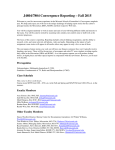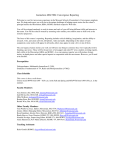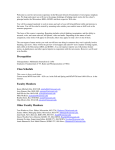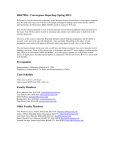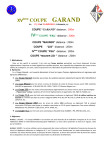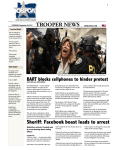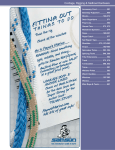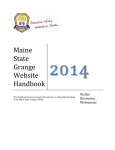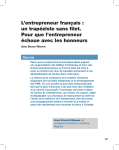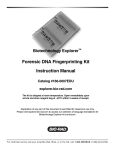Download Syllabus - Convergence Journalism
Transcript
Journalism 4804/7804: Covergence Reporting Welcome to your first newsroom experience in the Missouri School of Journalism’s Convergence emphasis area. We hope and expect you will rise to the unique challenge of helping report stories for the school’s principal media: the Missourian, KBIA, KOMU and their respective Web sites. You will be assigned randomly to work in teams and each of you will bring different skills and interests to the teams. You will be asked to stretch by assuming roles outside your comfort zone or skill level as the semester progresses. The focus of this course is reporting. Reporting includes critical thinking, imagination, and the ability to research, write, and create artwork, still photos, video and audio. Depending on the nature of each assignment, some stories will appear in all media, others may appear in only a few or one of them. The convergence feature stories you work on will have one thing in common: they won’t typically involve breaking, spot news. Those will be the purview of newspaper and radio/TV news students working regular, daily shifts at the Missourian, KBIA and KOMU. As a convergence reporter you will produce feature stories, in-depth pieces and other special reports in cooperation with the newsrooms. However, you’ll need to be flexible. Prerequisites Undergraduates: Multimedia Journalism (J-2150) Graduates: Fundamentals of TV, Radio and Photojournalism (J-7802) Class Schedule This course is three credit hours. Course meets MWF from 8:00 – 8:50 a.m. in the Fall and Spring and MTuWTh from 8:00-8:50 a.m. in the summer. Faculty Members Amy Simons, Rm. 001E, RJI, [email protected] Judd Slivka, Rm. 001D, RJI, [email protected] Mike McKean, [email protected] Reuben Stern, Rm. 001B RJI, [email protected] Rachel Wise, Rm. 001A RJI, [email protected] Other Faculty Members Stacey Woelfel, Director, Murray Center for Documentary Journalism; 243 Walter Williams, [email protected] Tom Warhover, Exec. Editor, Missourian, 882-5734, [email protected] Jeanne Abbott, Managing Editor, Missourian, 882-5741 [email protected] Ryan Famuliner, Interim News Director, KBIA-FM, 882-3431, [email protected] Randy Reeves, News Director, KOMU-TV, 884-NEWS, [email protected] Jeimmie Nevalga, Supervising Editor, KOMU-TV, 884-NEWS, [email protected] Annie Hammock, New Media Direcor, KOMU-TV, 884-News, [email protected] Paul Mossine, [email protected] Teaching Assistants Madi Alexander (Missourian), [email protected] Katy Mersmann (Missourian), [email protected] Hannah Shaw (KOMU), [email protected] Teaching assistants will staff the Futures Lab during Camp Convergence (January 22-February 5) to provide assistance to students in their assignments during the following hours: Monday: 9:30 a.m. – 11 a.m., 1 p.m.-5 p.m. Tuesday: 2 p.m. – 8 p.m. Wednesday: 9:30 a.m. – 11 a.m., 12 n – 2 p.m., 4 p.m. – 8:30 p.m. Thursday: 9 a.m. – 11 a.m., 1:30 p.m. – 6 p.m. Recommended Texts The Elements of Journalism – by Bill Kovach & Tom Rosenstiel Journalism Next – by Mark Briggs The Investigative Reporter’s Handbook, 4th Edition – by Brant Houston, Len Bruzzese and Steve Weinberg Recommended Viewing The Last Lecture – Achieving Your Childhood Dreams – Randy Pausch Shift Happens – 4.0 Check the course schedule often. Links to occasional online readings will appear there. You are expected to keep up with news from the print, online and on-air services of the Missourian, KOMU, KBIA and their local competitors. Class discussions will sometimes focus on that coverage. Course Policies and Procedures Code of Ethics The role of a journalist is to tell the truth, act independently and minimize harm. As such, journalism students are expected to read and comply with with the highest ethical standards. Though various codes have slight differences – you will find they are all based in the same values. Please review the codes for the following news organizations: Society of Professional Journalists, Radio, Television, Digital News Association and National Press Photographers Association. As a convergence student, you are held to a strict standard of being able to adapt to different newsroom environments and learning the policies of that work environment. If you ever have a question about an ethical standard, get in touch with your faculty editor as soon as possible. SPJ Code of Ethics RTDNA Code of Ethics NPPA Code of Ethics Academic Honesty Academic honesty is fundamental to the activities and principles of a university. All members of the academic community must be confident that each person’s work has been responsibly and honorably acquired, developed and presented. Any effort to gain an advantage not given to all students is dishonest whether or not the effort is successful. Academic misconduct includes but is not limited to the following: Use of materials from another author without citation or attribution. Use of verbatim materials from another author without citation or attribution. Extensive use of materials from past assignments without permission of your instructor. Extensive use of materials from assignments in other classes without permission of your instructor. Fabricating information in news or feature stories, whether for publication or not. Fabricating sources in news or feature stories, whether for publication or not. Fabricating quotes in news or feature stories, whether for publication or not. Lack of full disclosure or permission from editors when controversial reportorial techniques, such as going undercover to get news, are used. Classroom Misconduct When in doubt about plagiarism, paraphrasing, quoting or collaboration, consult with your instructor. For closed-book exams and exercises, academic misconduct includes conferring with other class members, copying or reading someone else’s test and using notes and materials without prior permission of the instructor. For open-book exams and exercises, academic misconduct includes copying or reading someone else’s work. Classroom misconduct includes forgery of class attendance; obstruction or disruption of teaching, including late arrival or early departure; failure to turn off cellular telephones leading to disruption of teaching; playing games or surfing the Internet on laptop computers unless instructed to do so; physical abuse or safety threats; theft; property damage; disruptive, lewd or obscene conduct; abuse of computer time; repeated failure to attend class when attendance is required; and repeated failure to participate or respond in class when class participation is required. IMPORTANT: Entering a classroom late or leaving a classroom before the end of the period can be extremely disruptive behavior. Students are asked to arrive for class on time and to avoid early departures. This is particularly true of large lectures, where late arrivals and early departures can be most disruptive. Instructors have the right to deny students access to the classroom if they arrive late and have the right to dismiss a student from the class for early departures that result in disruptions. Under MU policy, your instructor has the right to ask for your removal from the course for misconduct, disruptive behavior or excessive absences. The instructor then has the right to issue a grade of withdraw, withdraw failing or F. The instructor alone is responsible for assigning the grade in such circumstances. A Special Note about Web Access in Class The above language regarding classroom misconduct stems from discussions between MU Faculty Council and the Provost’s Office. While Convergence Journalism faculty endorse the intent expressed above, we also tolerate (and actively encourage in many instances) personal web access during class time. Attention to and mastery of content discussed during class is your responsibility. We will alert you if there are specific times during a lecture, training session or class discussion when we intend to limit or prohibit webs access. Dishonesty and Misconduct Reporting Procedures MU faculty are required to report all instances of academic or classroom misconduct to the appropriate campus officials. Allegations of classroom misconduct will be forwarded immediately to MU’s Vice Chancellor for Student Services. Allegations of academic misconduct will be forwarded immediately to MU’s Office of the Provost. In cases of academic misconduct, the student will receive at least a zero for the assignment in question. Professional Standards and Ethics The School of Journalism is committed to the highest standards of academic and professional ethics and expects its students to adhere to those standards. Students should be familiar with the Code of Ethics of the Society of Professional Journalists and adhere to its restrictions. Students are expected to observe strict honesty in academic programs and as representatives of school-related media. Should any student be guilty of plagiarism, falsification, misrepresentation or other forms of dishonesty in any assigned work, that student may be subject to a failing grade from the instructor and such disciplinary action as may be necessary under University regulations. Audio and Video Recordings of Classes Students may make audio or video recordings of course activity for personal use and review unless specifically prohibited by the faculty member in charge of the class. However, to foster a safe learning environment in which various viewpoints are respected, the redistribution of audio or video recordings or transcripts thereof is prohibited without the written permission of the faculty member in charge of the class and the permission of all students who are recorded. (Collected Rules and Regulations, University of Missouri, Sect. 200.015, Academic Inquiry, Course Discussion and Privacy) University of Missouri Notice of Notifications The University of Missouri System is an Equal Opportunity/ Affirmative Action institution and is nondiscriminatory relative to race, religion, color, national origin, sex, sexual orientation, age, disability or status as a Vietnam-era veteran. Any person having inquiries concerning the University of MissouriColumbia’s compliance with implementing Title VI of the Civil Rights Act of 1964, Title IX of the Education Amendments of 1972, Section 504 of the Rehabilitation Act of 1973, the Americans With Disabilities Act of 1990, or other civil rights laws should contact the Assistant Vice Chancellor, Human Resource Services, University of Missouri-Columbia, 130 Heinkel Building, Columbia, Mo. 65211, (573) 882-4256, or the Assistant Secretary for Civil Rights, U.S. Department of Education. Accommodations If you have special needs as addressed by the Americans with Disabilities Act and need assistance, please notify us immediately. The school will make reasonable efforts to accommodate your special needs. Students are excused for recognized religious holidays. Please let me know in advance if you have a conflict. ADA Compliance If you have special needs as addressed by the Americans with Disabilities Act (ADA) and need assistance, please notify the Office of Disability Services, A038 Brady Commons, 882-4696, or the course instructor immediately. Reasonable efforts will be made to accommodate your special needs. Religious Holidays Students are automatically excused for recognized religious holidays. Let your instructor know in advance if you have a conflict. Intellectual Pluralism The University community welcomes intellectual diversity and respects student rights. Students who have questions concerning the quality of instruction in this class may address concerns to either the Departmental Chair or Divisional leader or Director of the Office of Students Rights and Responsibilities (http://osrr.missouri.edu/). All students will have the opportunity to submit an anonymous evaluation of the instructor(s) at the end of the course. Course Assignments and Grading Both graduate and undergraduate students enrolled in this class are subject to plus/minus grading. Your grade will reflect these percentages: Style Quizzes – 10% There will be a quiz over the syllabus and five style/grammar quizzes during the semester, administered through the university’s Blackboard site. For the first four you will have 15 minutes to answer 10 questions. The last quiz will be 30 minutes long for 15 points. All the quizzes use the AP and Missourian stylebooks (open book.) If you have a problem accessing a style quiz or a computer issue, you must contact an instructor immediately or the quiz score will stand as given by Blackboard. Newsroom Shifts – 10% Newsroom shifts are graded based on the quality of your finished story files, self-evaluations in finished story files and feedback from newsroom editors. You are responsible for creating your folders and writing a summary of your newsroom shift in the classes folder. Be sure to include a link and/or copies of final articles/scripts/slideshows/mp3’s or movies in your folder as well. Folder structure: Classes>4804>Finished Stories Regardless of which three newsrooms a student chooses to work in, every student will attend two Missourian budget meetings during the course of the semester and will write a 250 word account of the meeting. What were the key points discussed? Where was the focus? (A news story from the previous day or how to approach the current day’s news) How might a multimedia student’s work fit in to the newsroom experience? These reports should be filed to the classes server along with your other newsroom reports. Convergence Team Story Assignments – 65% Story grades are based on several factors, including but not limited to the following criteria: o o o o o o Deadline performance Professionalism (e.g. problem-solving, teamwork and attitude) Journalism quality – Reporting, writing, storytelling, accuracy Innovation Technical quality – Audio quality, video quality, use of tripod, etc. AP Style for written work and photo captions Students face grade penalties on individual team stories for inaccuracies, missed deadlines and/or having to be given a story idea by a faculty member those penalties will be levied as follows: • • • Story ideas (1 letter grade/10 points): If a faculty member has to give your team a story idea because you haven’t developed a viable one yourselves, you are subject to a 10-point deduction on your team story grade. Fact errors (2 letter grades/20 points): As journalists, we have nothing if we don’t have credibility. Reporting fact is at the foundation of the contract we have with our readers, viewers and site visitors. When we make fact errors, we chip away at that mutual trust. Fact errors could result in a 20-point deduction on your team story grade. Missed deadlines (2 letter grades/20 points): We live in a world of deadlines. Our broadcasts go on the air at a set time. Our papers and magazines have press runs that must start at a certain time to ensure delivery. Our web audiences are always looking for the most up-to-date news and information. Deadlines in this class are not fluid, and missing them is not an option. Failure to meet the 6 p.m. deadline on team stories will result in a 20-point deduction. Peer Evaluations – 5% Much of the work in convergence journalism courses is team-based. One complaint about teams is that some people will take advantage of stronger teammates and allow themselves to “coast” without putting forth their own best effort. To create more effective teams you will grade and be graded by your classmates on each of your team stories. The evaluation form is posted on Blackboard (in Assignments) that you’ll be expected to fill out and submit after each team story. Deadline for the evaluation is 8am Friday. Failure to complete the form will result in a 0 (zero) for you and full credit for your teammates. Class participation and Attendance – 10% Class participation and attendance are vital and can rarely be made up. Classes are designed to supplement your hands-on learning, introduce new ideas and bring up big picture topics that may or may not be relevant to your reporting during any one week. If you need help with operating cameras, software or advice on stories, faculty and staff are happy to provide additional instruction in the Futures Lab. We will take attendance at every class. You may miss four classes (three in the summer sessions) for any reason without penalty. We will not judge absences as excused or unexcused. Please check with a classmate to find out what happened in class when you were gone. If you still have questions about the material, check in with an instructor. After four (three) absences, each additional absence will result in a lower letter grade for attendance. If you have a chronic issue or illness that causes you to miss class for more than a week, please see an instructor. *** There will not be a mid-term or final in this class. Undergrads are assigned grades on the plus/minus scale. Grad students are assigned plus/minus grades through C-. No D grade may be awarded a graduate student, and a grade of F means the work has not satisfied the minimum requirements of the course. Deadlines are listed in the syllabus, though they may be altered occasionally after consultation between convergence faculty and editors at the Missourian, KBIA and KOMU. If we discover after publication/broadcast that you were responsible for a significant fact error in a story, your grade for that story will be dropped by one letter. Plagiarizing any portion of a story will result in a failing grade for the course. Please feel free to meet with us at any time to discuss grades or any other issue. Part of professionalism is seeking advice when needed to handle special concerns or problems or to propose new ideas or innovations. Stories turned in after the 6pm deadline will be docked at least one letter grade. Failure to complete an assignment or your part of an assignment may lead to a failing grade in the course. Extra credit opportunities: Blogging: If you create a blog and add at least one post per week to the blog during the semester, you can increase your final grade by 5 points. (For example, a B plus, becomes an A minus.) Where you see assignments due each week, there is a reminder to blog. We will discuss options for your blog in class. You will also be told how many posts are required during your team to earn the extra credit. It will vary from semester to semester depending on lecture schedules and the length of the term. Mike McKean’s Search Tools exercise: Though you’ve been using the World Wide Web most of your college careers — there are many ways the Web can be used strategically by reporters. After a class lecture on search tools, Mike McKean offers an Internet search exercise. If you successfully complete the search with a grade of 80% or higher, you’ll get 5 points added to your end of semester Style Quiz grade. Graduate Student Assignment Graduate students will complete an additional assignment that combines the creation of a portfolio site and offers high-level analysis of developments in the world of online journalism. Click here for the full details of the graduate assignment, due dates and instructions for submission. Completion of this assignment is required for graduate students to pass this course. Your grade will be counted as the majority of the attendance portion of your grade in this class. You may not receive a passing grade for this class without completing this assignment. Writing Intensive Requirements All MU undergraduate students are required to complete an upper-division writing intensive course in their major. Journalism 4804 satisfies that requirement for Convergence Journalism majors. All WI courses use writing as a tool for thinking and learning; all require revision as a way of improving critical thinking. Here’s how we’ll carry out those goals. • • • • News feature reporting projects/team stories: On weeks when you are working on a team story, you will write scripts, text stories, photo captions, information graphics, etc. These news stories will take on extensive revisions as you work with student project managers and faculty editors leading up to deadline. Team stories will be followed by a one-page written evaluation of your teammates’ performance on your project. Written bi-weekly newsrooms update: Each week you work in a newsroom, you will submit brief written report describing the story you covered, multimedia content you produced and any issues may have arisen on your shift. We may occasionally refer to these updates in class discussion. In-class presentation: There is one informal in-class presentation in which you and a partner(s) will demonstrate a new tech tool and evaluate it’s potential uses for journalists. Blogging: We expect you to write/produce content regularly for your own blog. If you already have one, just send Amy or Karen the link. If you need to create one, there are a variety of tools. Blogger.com, Weebly.com and WordPress.com are good options. You may also send me your Twitter address if you’d like me to follow your tweets. (Optional) Work for all students will be graded on the following plus/minus A-F scale. A+ 97-100 A 94-96 A 90-92 B+ 87-89 B 84-86 B- 80-82 C+ 77-79 C 74-76 C- 70-72 F 69 or lower Lecture Schedule and Readings & Deadlines Week 1 Monday, January 19 MLK Day -- No class, no newsroom shifts Wednesday, January 21 Topic/Subject: Introductions. Syllabus review. Getting Started. Multimedia technique refresher. Lecturer: Amy Simons Meet your faculty and find out what you'll be doing in the Convergence Reporting course. Come ready to work! QUIZ: Syllabus quiz will be open on Blackboard from 9 a.m. today until 8 a.m. Monday, January 26. Out-of-Class Readings Laura Davison: Twelve ways to get through Convergence Reporting (and like it) Resources How to connect to the Classes Server Newsroom shifts Lab procedures/policies Friday, January 23 Topic/Subject: Using a Zoom, editing with Adobe Audition & KBIA scripting Lecturer: Judd Slivka **We will be meeting in Tucker Forum today** In the Futures Lab and at KBIA you'll be using Adobe Audition instead of Audacity. We'll go over some of the differences between the two programs as well as review some of the basic techniques of effective audio reporting using NPR style. Out-of-Class Readings 10 Commandments of Getting Good Natural Sound Resources Assembling a Basic Audio Story in Adobe Audition Complete Marantz Manual Template for 4804 KBIA/KOMU stories -- FOR USE ON TEAM STORIES/IN THE FUTURES LAB Instructions for working at KBIA KBIA Guide to Scripting (pdf) -- FOR USE AT KBIA Abbreviated KBIA guide to a wrap or package (pdf) -- FOR USE AT KBIA Setting up and using a wireless microphone KBIA Beat Sheet KBIA Work Examples Jessica Naudziunas – Peanut Butter Prices Rising Kyle Stokes – Big Storm Kyle Stokes – “C” is for Cuts Jessica Naudziunas – Cattle Rustling Jacob Fenston – Six Months After the Storm KGOU Budget Storm on the Horizon CAMP CONVERGENCE ASSIGNMENT: Audio and still photography Week 2 **Special note: KBIA is holding on-site orientation at 9:30a and 1:30p on Wednesday and Thursday. Everyone scheduled to work at KBIA during the semester is required to attend one session** Monday, January 26 Topic/Subject: Shooting video with a DSLR Lecturer: Paul Mossine You will be using the Nikon D7000 DSLR to shoot still photos and video in your convergence courses. Today you will learn how to set up the DLSR, Beachtek pre-amp and tripod. Out-of-Class Readings Creating a Library in FCPX (This is needed for saving video files on the ISIS server) Exporting video from FCPX Resources Link to download the Nikon D7000 user manual (PDF) Help file: Setting up the D7000 for shooting video Help file: Exporting and compressing your Final Cut Pro X video projects Lab procedures/policies STYLE QUIZ 1: Available on Blackboard from 9am Monday until 6pm Wednesday AP/Missourian stylebook Wednesday, January 28 Topic/Subject: Editing Refresher: Using Final Cut Pro X Lecturer: Rachel Wise Camp Convergence Assignment: Video Assignment Thursday, January 29 Audio slideshows due on the Classes Server by 6 p.m. Friday, January 30 Topic/Subject:How to write and turn in your story pitches Lecturer:Amy Simons **We will be meeting in Tucker Forum** As a convergence reporter, you'll be doing six team stories this semester. Each team will be expected to turn in a minimum of three pitches per story assignment. During this class we'll talk about what makes a successful story pitch, how to develop your pitch and how to present it to faculty. Out-of-Class Readings Lee Walburn: Editors at Work: Finding Good Story Ideas Kenna Griffin: Twelve Tips For Finding Story Ideas Six questions journalists should be able to answer before pitching a story 6 Ways Journalists Can Use Press Releases Effectively Watch: Excerpts from ABC's "Shark Tank" Resources Story pitch form Checklist for completing team stories Finding good story ideas Stories we don't want to see again (PDF) Examples of successful story pitches (PDF) How to get an A on my next team story KOMU/KBIA Script template (Word Doc) • • • • Three team story ideas are sent to faculty editors and project managers by Tuesday night at 7 p.m. Send email to [email protected] The subject line of the email should be: 4804 story pitches, Team Name/Number Fridays we meet at 8 a.m. in the Futures Lab to discuss your best ideas. Your team stories are due the following Thursday at 6 p.m. with all components of your story saved to the !FinishedStories section of the Classes Server in the folder for each person in the group. (Each student’s folder must contain every element of your story, text, photos, video, captions, mp3’s, PDF’s, etc.) Week 3 Monday, February 2 Topic/Subject: Newsroom orientation: KOMU & Newsy Lecturer: Amy Simons In class guests: Hannah Shaw, Annie Hammock, Nathan Byrne Newsroom shifts will begin NEXT WEEK. Today we'll go over what you'll be doing during your KOMU and Newsy shifts and what you need to know to be successful in those newsrooms. Out-of-Class Readings Multi-source journalism and the rise of video: An inside look at Newsy Resources Matheny Map KOMU Shift Checklist/Workflow (pdf) Going solo at KOMU (pdf) Newsroom dress codes Mike Team story 1 Team 1 Claire Banderas Amanda Byler Team 2 Shih-Wei Chou Ashton Day Team 3 Site Ma Lindsay Gloor Team 4 Katherine Hambrick Ginger Hervey Team 5 Katherine Hogsett Jason Boatright Team 6 Story ideas due to faculty and project managers by 6 p.m. Tuesday. Kamila Jambulatova Story ideas due to faculty and project managers by 6 p.m. Tuesday. Wednesday, February 4 Topic/Subject: Newsroom orientation: Columbia Missourian Lecturer: Judd Slivka Today we'll be going over what you'll be doing during your Missourian shifts and what you'll need to know to be successful in that newsroom Out-of-Class Readings TBA Resources TBA Thursday, February 4 Video assignments due on the Classes Server at 6 p.m. Friday, February 5 Mike weekly pitch meeting with faculty and project managers in the Futures Lab Week 4 **Newsroom shifts start this week. All shift summaries must be filed to the Classes Server by 6 p.m. on Saturdays from this point on. Monday, February 9 Topic/Subject: What does "A" work look like? Lecturer: Amy Simons Your team stories will make comprise more than half of your semester grade. Undoubtedly, you want to do well. What does 'A' work look like? How can do you 'A' work? We'll go over examples, talk about how to manage your time, etc. Out-of-Class Readings eRes: Aim For the Heart, Chapter 3 (Tompkins) Team Story: "5 sex offenders live illegally close to schools" Team Story: "Business failures bring renewed lessons, drive" Resources How to get an A on my next team story Bob Dotson's Reporter's Checklist Ike Team story 1 Team 1 Samantha Kummerer Jacqueline LeBlanc Team 2 Ailin Li Jacob Scholl Team 3 Mary McIntyre Erjun Peng Team 4 Juntao Peng Micheala Sosby Team 5 Daniela Vidal Austin Wakeman Team 6 Story ideas due to faculty and project managers by 6 p.m. Tuesday. Xiaoqian Li Wednesday, February 11 Topic/Subject: Revisiting VINCE Lecturer: Judd Slivka The best stories are visual, interesting, new, present conflict and are enterprising. How can you bring those elements into your reporting? Out-Of-Class Readings eRes: Aim for the Heart, Chapter 3: Find Memorable Characters (Tompkins) Resources Dotson checklist Thursday, February 12 Mike team stories due to 6 p.m. Friday, February 13 Story pitches for Ike teams. Meet in RJI Futures Lab. Graduate students: Installment 1 of your graduate project is due today at 6 p.m. Week 5 Monday, February 16 Topic/Subject: In-Class critique Lecturer: Amy Simons With the first deadline day passed, we'll sample the team stories turned in last week. Be prepared to offer feedback -- positive and constructive -- on your classmates' work. STYLE QUIZ 2: Available on Blackboard from 9am Monday until 6pm Wednesday Story ideas due to faculty and project managers at 6 p.m. Tuesday. Mike Team story 2 Team 1 Claire Banderas Lindsay Gloor Team 2 Amanda Byler Katherine Hambrick Team 3 Shih-Wei Chou Ginger Hervey Team 4 Ashton Day Katherine Hogsett Team 5 Site Ma Kamila Jambulatova Team 6 Story ideas due to faculty and project managers by 6 p.m. Tuesday. Jason Boatright Wednesday, February 18 Topic Subject: Photo Refresher Lecturer: Judd Slivka Are you manipulating the camera or is the camera manipulating you? Time to review and freshen up those DSLR skills! Out-of-Class Readings High ISO shooting tips Nikon: Understanding ISO sensitivity Mostly understandable explanation of exposure (aperture, shutter speed, ISO) Nikon: Composition Guidelines Five Basic Rules of Shot Composition Photography Quick Course Guide (PDF file) Lions and Eagles and Snow, Oh My! Resources Basic Nikon D7000 camera settings Each photo must have a caption – Caption help file Examples of good detail photos SLR Camera Simulator Text should always conform to proper style – The five-minute stylebook Photoshop tutorial (from the Knight Digital Media Center) Link to Download the Nikon D7000 user manual (PDF download) Nikon D70 manual (pdf) Nikon D80 manual (pdf) Thursday, February 19 Ike team stories due at 6 p.m. Friday, February 20 Story pitches for Mike teams in the RJI Futures Lab Week 6 Monday, February 23 Topic/Subject: What don't you know? Lecturer: Amy Simons STYLE QUIZ 3: Available on Blackboard from 9am Monday until 6pm Wednesday That's a loaded question, right? Want to know what we're doing in class today? Well, we're not going to tell you! Trust us, there's a lesson built in here. READINGS Listen: The three hardest words in the English language: A new Freakonomics Radio Podcast Ike Team story 2 Team 1 Samantha Kummerer Erjun Peng Team 2 Jacqueline LeBlanc Juntao Peng Team 3 Ailin Li Micheala Sosby Team 4 Xiaoqian Li Jacob Scholl Team 5 Mary McIntyre Austin Wakeman Team 6 Story ideas due to faculty and project managers by 6 p.m. Tuesday. Story ideas due via email by 6 p.m. Tuesday. Daniela Vidal Wednesday, February 25 Topic/Subject: Interviewing Lecturer: Amy Simons Have you ever found yourself interviewing someone and you're just not able to get them to open up? Or maybe they're saying a lot, but none of it's helpful? Learn new techniques for taking control of your interviews and walking away with stellar material. Out-of-Class Readings eRes: Aim For the Heart, Chapter 6: "The Art of the Interview" (Tompkins) Interviewing techniques The Art of the Interview, ESPN-style Tips for interviewing people with disabilities Interviewing crime victims Thursday, February 26 Mike team stories due at 6 p.m. Friday, February 27 Story pitches for Ike teams in the RJI Futures Lab Week 7 Monday, March 2 Topic/Subject: Writing for the Ear Lecturer: Amy Simons Broadcast-style writing requires a different approach than the writing you've done all your life. You're writing to be heard, instead of to be read. During this class session, you'll learn techniques on how to write conversationally while effectively writing to visuals and natural sound. Out-of-Class Readings eRes: Aim for the Heart: Chapter 4, "Writing Compelling Leads" (Tompkins) Lifehacker: I'm Ira Glass, Host of This American Life, and this is how I Work Resources Let's Write Right -- A guide to tightening up broadcast writing (PDF) Mike Team story 3 Team 1 Claire Banderas Kamila Jambulatova Team 2 Amanda Byler Katherine Hogsett Team 3 Shih-Wei Chou Katherine Hambrick Team 4 Ashton Day Lindsay Gloor Team 5 Site Ma Ginger Hervey Team 6 Jason Boatright Elizabeth Eisterhold Story ideas due to faculty and project managers by 6 p.m. Tuesday. Story pitches due by 6 p.m. Tuesday. Wednesday, March 4 Topic/Subject: Intermediate Blogging Lecturer: Amy Simons You have done some basic blogging in J2150 and J7802. Now you have the opportunity to blog for extra credit, this time on the topic of your choice. We'll talk about how to choose a topic that's meaningful to you -- and turn it into a sustainable blog that you can be proud of for a long time to come. Out-of-Class Readings Al Tompkins: Blog Ethics (PDF) The best ways to be sure you're legally using online photos Why Journalists Must Blog & How How To Create Your Own Blog How To Build An Audience Giving Your Blog A Visual Edge Adam Westbrook: Five Mistakes I Wish I Hadn't Made Interact With Your Niche To Find New Readers Resources A Guide to Happy (and Legal) Tumblr-ing 20 Great Blogs By Journalists What is Creative Commons (Video) Creative Commons FAQ Flickr: Creative Commons Extra credit: Earn an additional half a letter grade on your final semester grade by blogging once weekly until the end of the semester. Must have 9 posts to earn the extra credit. Posts must be live on your sites by 6 p.m. on Saturdays to earn the credit for that week. Thursday, March 5 Ike team stories due at 6 p.m. Friday, March 6 Story pitches for Ike teams in the RJI Futures Lab Week 8 Monday, March 9 Topic/Subject: Writing strong intros & nut grafs Lecturer: Judd Slivka STYLE QUIZ 4: Available on Blackboard from 9am Monday until 6pm Wednesday Intros and nut grafs are key to driving home your story's impact with readers/viewers. What goes into crafting an effective nut graf -- and how can you be sure you're doing it in each and every story you write? Out-of-Class Readings The Nut Graf, Part I Nut Grafs, the Lynchpins of Clear Writing The Art of the Nut Graf: Don't Just Get New Visitors, Keep Them Strong From the Start: Leads & Nut Grafs Ike Team story 3 Team 1 Samantha Kummerer Austin Wakeman Team 2 Jacqueline LeBlanc Daniela Vidal Team 3 Ailin Li Juntao Peng Team 4 Mary McIntyre Micheala Sosby Team 5 Xiaoqian Li Erjun Peng Team 6 Story ideas due to faculty and project managers by 6 p.m. Tuesday. Jacob Scholl Story ideas due via email by 6 p.m. Tuesday. Wednesday, March 11 Topic/Subject: Story Construction Lecturer: Judd Slivka The key to getting a successful story out the door often has less to do with reporting than it does with how a story is structured. How can you structure your facts to create a compelling story that makes sense? Out-Of-Class Readings Structuring stories for meaning Resources 6-box simple storyboarding template Shot-list style storyboarding worksheet Thursday, March 12 Mike team stories due at 6 p.m. Friday, March 13 Story pitches for Ike teams in the RJI Futures Lab Graduate students: Installment 2 of your graduate project is due today at 6 p.m. Week 9 Monday, March 16 Topic/Subject: Internet Search Tools Lecturer: Mike McKean There's more to searching the Internet than going to Google. Professor Mike McKean introduces us to some web tools you can start using today. Out-of-Class Readings None Resources Mike McKean’s Search Tools Web Scavenger Hunt Mike Team story 4 Team 1 Claire Banderas Team 2 Amanda Byler Team 3 Shih-Wei Chou Team 4 Katherine Hambrick Team 5 Ginger Hervey Team 6 Lindsay Gloor Story ideas due to faculty and project managers by 6 p.m. Tuesday. Ashton Day Site Ma Elizabeth Eisterhold Kamila Jambulatova Katherine Hogsett Jason Boatright Story pitches due via email at 6 p.m. Tuesday. Wednesday, March 18 Topic/Subject: Where is the line? Lecturer: Judd Slivka Is a source giving you the cold shoulder? Is a spokesperson preventing you from accessing the "real person?" Has someone told you that you can't shoot photos of their children while you're standing on a public street? When should get aggressive and when should you back off? We'll talk about where the line is -- and when you should (and shouldn't) cross it. Thursday, March 19 Ike stories due at 6 p.m. Friday, March 20 Story pitches for Mike teams in the RJI Futures Lab Week 10 Spring Break: No classes, no newsroom shifts. If you're blogging for extra credit, you must still blog one weekend of the break in order to have enough posts to earn the extra credit. Week 11 Monday, March 30 Topic/Subject: Visualizing the non-visual Lecturer: Amy Simons How many times have you been tempted to pitch a story for KBIA because you figure it's just not visual? Every story is visual, trust us! Out-of-Class Readings Ten tips to dramatically improving your video journalism stories Poynter Chat Replay: What Tools Journalists Can Use to Improve Their Visual Storytelling Skills Resources Video: How to edit a sequence Best practices for visual storytelling How to critique your own visual story Types of shots and sequences Visual grammar Your step by step guide to creating a traditional 1:30 TV/television package Examples of good detail shots Ike Team story 4 Team 1 Samantha Kummerer Xiaoqian Li Team 2 Jacqueline LeBlanc Jacob Scholl Team 3 Ailin Li Erjun Peng Team 4 Juntao Peng Austin Wakeman Team 5 Micheala Sosby Daniela Vidal Team 6 Story ideas due to faculty and project managers by 6 p.m. Tuesday. Mary McIntyre Story pitches due via email at 6 p.m. Tuesday. Wednesday, April 1 Topic/Subject: Engaging with your audience Lecturer: Joy Mayer Engaging with your audience means so much more than posting a link to Facebook or Twitter and waiting for the comments to roll in. It's about having a continuous conversation with your community. Joy Mayer, Director of Community Outreach at the Columbia Missourian has done extensive research on the topic and brings it into practice leading the Missourian's Community Outreach team. What does it do? How does it work? Maybe it'll be a place you'll see yourself fitting in! Out-of-Class Readings Joy Mayer: Engaging Communities: Content and Conversation Joy Mayer: What Engagement Means to the Guardian's Meg Pickard Measuring Community Engagement: A Case Study from Chicago Public Media RJI: Community Engagement If investigative reporters don’t explain the impact of their work, who will? Resources Joy Mayer’s Engagement page on Delicious Thursday, April 2 Mike stories due at 6 p.m. Friday, April 3 Story pitches for Ike teams in the RJI Futures Lab Week 12 Monday, April 5 Topic/Subject: Ethics & Social Media Lecturer: Amy Simons We use social media in various ways -- as journalists and as individuals. But, what happens when those worlds collide? Out-of-Class Readings Alica Stice: Remember that time Derrick Washington got mad at me on Twitter? Joy Mayer: Journalistic transparency in a red-state-blue-state world Why Profile Photos Matter: Is Your's Appropriate? Five ways to avoid sabotaging your online brand Poynter: Ten ways journalists can use Twitter before, during and after reporting a story Vadim Lavrusik: How journalists can use Facebook Graph Search for Reporting Resources RTDNA Social Media guidelines ASNE social media best practices AP Social Media Guidelines for Employees (pdf) Ten LinkedIn Tips for Journalists Twitter: Tweet Your Beat: Tips for Sports Journalists Facebook: Best Practices for Journalists on Facebook Mike Team story 5 Team 1 Ginger Hervey Team 2 Elizabeth Eisterhold Team 3 Katherine Hambrick Team 4 Ashton Day Team 5 Shih-Wei Chou Team 6 Katherine Hogsett Story ideas due to faculty and project managers by 6 p.m. Tuesday. Amanda Byler Claire Banderas Lindsay Gloor Site Ma Kamila Jambulatova Jason Boatright Story pitches due to faculty and project managers via email Tuesday at 6 p.m. Wednesday, April 8 Topic/Subject: Information Graphics Lecturer: Reuben Stern Basic introduction to an alternative visual storytelling technique. Please be sure to bring paper and a pen/pencil to class today. Resources Graphic resources (compiled by Reuben Stern) (PDF) 100 Incredible Infographic Tools & Resources Creating Embeddable Google Maps (PDF) Thursday, April 9 Deadline Ike teams at 6 p.m. Friday, April 10 Story pitches for Mike teams in the RJI Futures Lab Week 13 Monday, April 13 Topic/Subject: Data reporting Lecturer(s): Mike Horvit Mark Horvit, executive director of Investigative Editors and Reporters joins us to show you techniques for incorporating data in your journalism. Ike Team story 5 Team 1 Micheala Sosby Jacqueline LeBlanc Team 2 Daniela Vidal Jacob Scholl Team 3 Juntao Peng Erjun Peng Team 4 Xiaoqian Li Mary McIntyre Team 5 Ailin Li Austin Wakeman Team 6 Story ideas due to faculty and project managers by 6 p.m. Tuesday. Samantha Kummerer Team story ideas due via email at 6 p.m. Tuesday Wednesday, April 15 Topic/Subject: Interviewing the Data Lecturer: Judd Slivka Now that you've got a data set, what should you do with it? Get a sense of what types of patterns to look for and how to find a needle in that haystack. Thursday, April 16 Mike team stories due at 6 p.m. Friday, April 17 Story pitches for Ike teams in the RJI Futures Lab Graduate students: Installment 3 of your graduate project is due today at 6 p.m. Week 14 Monday, April 20 Topic/Subject: Photo Editing Lecturer(s): Paul Mossine STYLE QUIZ 5/FINAL: Available on Blackboard from 9am Monday until 6pm Wednesday You have hundreds of photos in front of you... What makes the successful ones successful? When can cropping and toning bring back a "bad" photo? How do you choose the right ones to build a photogallery that tells a story? Mike Team story 6 Team 1 Kamila Jambulatova Team 2 Katherine Hogsett Team 3 Elizabeth Eisterhold Team 4 Katherine Hambrick Team 5 Amanda Byler Team 6 Ginger Hervey Story ideas due to faculty and project managers by 6 p.m. Tuesday. Ashton Day Shih-Wei Chou Claire Banderas Site Ma Lindsay Gloor Jason Boatright Story ideas due via email at 6 p.m. Tuesday Wednesday, April 22 Topic/Subject: Amy Webb's Tech Trends, Part I Lecturer: Lynda Kraxberger Amy Webb is a well-known technology prognosticator who presents a list of her top ten tech trends each year at the Online News Association conference. Prior to class today, be sure to watch the video from her session from this year's conference held in Chicago in September. Out-of-Class Readings Watch the ONA2014 session with Webb Media's Amy Webb Thursday, April 23 Ike team stories due at 6 p.m., Friday, April 24 Story pitches for Mike teams in the RJI Futures Lab Week 15 Monday, April 27 Topic/Subject: Using Thinglink Lecturer: Judd Slivka ThingLink has become a new favorite tool for interactive mapping among Convergence Reporting students. During today's class period, we'll look at some effective uses of the tool (and some that might not have been as successful). Ike Team story 6 Team 1 Austin Wakeman Xiaoqian Li Team 2 Daniela Vidal Ailin Li Team 3 Micheala Sosby Samantha Kummerer Team 4 Juntao Peng Mary McIntyre Team 5 Jacqueline LeBlanc Erjun Peng Team 6 Story ideas due to faculty and project managers by 6 p.m. Tuesday. Story ideas due via email at 6 p.m. Tuesday Jacob Scholl Wednesday, April 29 Topic/Subject: Tech Trends, Part II Lecturer: Lynda Kraxberger Student teams will present their "road tests" of the tech trends introduced before break. Thursday, April 30 Final Mike team stories due at 6 p.m. Friday, May 1 Story pitches for Ike teams in the RJI Futures Lab Week 16 Monday, May 4 Topic/Subject: Course wrap-up and evaluations Lecturer: Amy Simons Wednesday, May 6 Topic/Subject: Wild Card!!! Lecturer: TBA Thursday, May 7 Final deadline day for Garth teams. Stories due at 6 p.m. Graduate students: Installment 4 of your graduate project is due today at 11:59 p.m. Friday, May 8 Reading Day. No classes. Grading begins at 9am WEEK 17 – Finals week; no classes, no shifts.






















